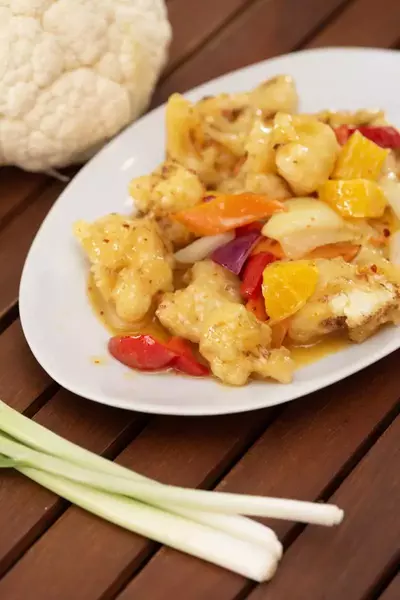Orange cauliflower
⾹橙椰菜花 ⓥ vegan
Orange Blumenkohl ⾹橙椰菜花 ⓥ vegan
Discover the unique flavor of Orange Cauliflower! Our vegan dish features crispy fried cauliflower florets, fresh orange, carrots, red bell pepper, and onions, all stir-fried in a wok.
The secret to its distinct taste lies in our homemade orange sauce, carefully prepared and added to the stir-fried ingredients, before adding the crispy cauliflower florets.
is a wonderfully aromatic, vegan dish that tantalizes the senses and is packed with healthy ingredients. Try it today and let our Orange Cauliflower ⾹橙椰菜花 ⓥ enchant you!
What colors does cauliflower come in?
Typically, cauliflower comes in a single color - white. This is the most common color of cauliflower and is often found in supermarkets and farmer's markets. However, there are also some varieties of cauliflower available in other colors, such as green, yellow, orange, and purple.
These varieties are not as widely available as the white variety and may be harder to find depending on location and availability.
It is important to note that these different colors of cauliflower do not have any impact on the taste or nutrients they contain. The different colors are simply the result of natural pigments in the cauliflower and may vary depending on the variety.
How does cauliflower become colorful?
Cauliflower becomes colorful due to the presence of natural pigments in the flower buds. The different colors are a result of varying amounts and types of pigments.
For example, purple cauliflower is created by anthocyanin pigments, which are also found in other plant-based foods such as red grapes, blueberries, and red cabbage. On the other hand, yellow and orange cauliflower have higher concentrations of carotenoid pigments, which are also found in carrots and other yellow and orange fruits and vegetables.
There are also special varieties of cauliflower that have been bred to be different colors, such as green cauliflower, which is created by higher amounts of chlorophyll. However, it is important to note that the different colors of cauliflower do not have any impact on the taste or nutrients they contain.
How healthy is cauliflower?
Cauliflower is a very healthy vegetable that is rich in various nutrients and health-promoting substances. Here are some of the key health benefits of cauliflower:
1. Nutrients: Cauliflower is rich in vitamins and minerals such as vitamin C, vitamin K, folate, calcium, potassium, and magnesium.
(Study on Vitamin C and K content in Cauliflower: https://pubmed.ncbi.nlm.nih.gov/23853803/)
2. Antioxidants: Cauliflower contains various antioxidants, including beta-carotene, vitamin C, and quercetin. These substances can help protect the body against damage from free radicals.
(Study on antioxidant capacity of Cauliflower: https://www.sciencedirect.com/science/article/pii/S0308814604009371)
3. Digestion: Cauliflower contains fiber, which can help promote digestion and improve gut health.
(Study on the effects of fiber on digestion and gut health: https://www.ncbi.nlm.nih.gov/pmc/articles/PMC3705355/)
4. Cancer prevention: Studies have shown that cauliflower contains certain compounds that can act as cancer-preventive agents. These include sulforaphane and indole-3-carbinol, both of which have been shown in studies to inhibit the growth of cancer cells.
(Study on the anticancer properties of sulforaphane in Cauliflower: https://www.ncbi.nlm.nih.gov/pmc/articles/PMC3074486/)
5. Weight loss: Cauliflower is low in calories and high in water and fiber, which can help promote a feeling of fullness and support weight loss.
(Study on the effects of low-calorie, high-fiber diets on weight loss: https://www.ncbi.nlm.nih.gov/pmc/articles/PMC5929174/)
6. Heart health: Cauliflower contains potassium, which can help lower blood pressure and reduce the risk of cardiovascular disease.
(Study on the effects of potassium on blood pressure and cardiovascular disease: https://www.ncbi.nlm.nih.gov/pmc/articles/PMC6212970/)
See also Broccoli

Wai Wah Yung










